Do Italy and the Netherlands know each other well enough?
On the role of a translator from Dutch into Italian and the challenges that this job involves (Michele Restuccia)
Since the Middle Ages, at the time of the great merchants and bankers, and throughout history Italy and the Netherlands have always cultivated their diplomatic and commercial relations. However, even today these two old friends seem not knowing each other well and the popular imagery of both countries is often based on stereotypes: Italy is the home of sun and clear blue sea, while the Netherlands are the land of tulips, windmills and of course Van Gogh. During an interview with the translator and cultural intermediary Claudia Di Palermo, I got the chance to have an exchange of views about the present contacts between Italy and the Netherlands and to learn more about the work that literary translators carry out when translating the Dutch culture for an Italian reader.
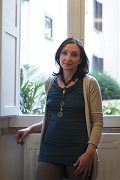
Claudia Di Palermo (b. 1967) is one the most renowned literary translators from Dutch in Italy. For more than 15 years she has been advisor to Italian publishers on Dutch literature, cultural intermediary between Italy and the Netherlands, and she has given an Italian voice to many Dutch authors who enjoy great fame in the Netherlands, like Bordewijk, Benali, Brokken, Grunberg, Kellendonk, Slauerhoff, to name but a few. In 2011 she was awarded the Dutch Literature Foundation Prize, which is given to translators who have made a special effort to promote Dutch culture and literature in their own country. In the jury report Claudia Di Palermo was described in the words of Tom Lanoye as a person who is endowed with ‘’an unquenchable love of letters, the fighting of a lioness and the devotion of a Mediterranean mother’’.
The meaning of being a translator
‘’This is a very difficult question. For me, it basically means bringing the one to the other’s home and I try to lead the reader as much as possible, without being too didactic. Alas, when I translate from Dutch, I always ask myself so many questions: do the readers understand this? Can I leave this word like this? Will the reader have the curiosity to go and find out more about this specific concept? I believe that literature should not become too much of an obstacle course. It is also about a fine balance between trying to make a novel understandable for a foreign reader without trivialising it.’’
In line with this vision, Claudia also believes nothing is untranslatable, but she is aware that sometimes there are feelings or a particular familiar flavour, that cannot be conveyed with the same immediacy. ‘’If there’s one thing that borders on the untranslatable, it’s the food. […] By the wat, I don’t know why we always end up talking about food in Italy’’.
A lack of context: what do Italians know about the Netherlands?
Beyond the translation difficulties related to the text, there is an underlying problem that Claudia often had to deal with: the lack of context. Claudia argued in an article published on the Italian newspaper Il Manifesto that we could do more in Italy to promote Dutch literature, which is very diverse given the country’s rich past. However, it is sad to observe that even today a large part of our mutual knowledge is based on clichés and what is even more surprising is that Italians very often can’t even pronounce a Dutch word or name, since this language appears so complicated to us.
According to Claudia Di Palermo, these are indications of a lack of context: ‘’I believe we have to give a context. Italian writers write their stories in a context that is very often known abroad. This either confirms stereotypes or creates an idyllic image of Italy (in Northern Europe people still have a bit of an idyllic myth of Italy: the sun, the sea, etc.). These stories respond to the readers’ need to re-enter a context familiar to them. On the other hand, precisely because Dutch culture is little known in Italy, Italians do not identify with this [the Dutch] context’’
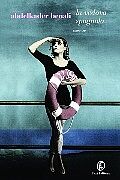

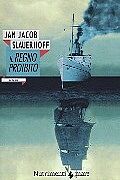
Furthermore, as Claudia argues, Dutch novels are sometimes ‘’too Dutch’’, which can be an obstacle for Italian readers who do not understand such a profoundly different reality. Nevertheless, we should not forget that the Netherlands and Italy have different backgrounds and have evolved differently in recent decades, even though they are relatively close neighbours. A past as colonial power, histories of violence and suppression in the colonies, the arrival of gastarbeiders have shaped the face of the Netherlands we know nowadays. All these events have led on the one hand to a greater reworking of the past, and on the other hand to a desire to learn about stories of immigrants and children of the second generation.
‘’In the Netherlands in the early 2000s there was a moment of great reflection on the clash of cultures, and this was the moment of great exploit of writers of the second generation, such as Benali. People felt extremely shaken by this socio-cultural discussion. Then we remember Theo Van Gogh’s assassination. Later on many other similar episodes took place. Therefore, people really wanted to know more and to give space to second generation writers. In Italy such reflection has not yet taken place’’, Claudia said during our interview.
Which book has marked you the most?
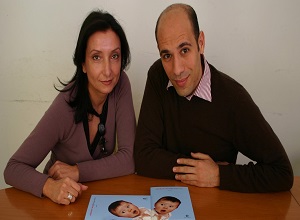
Claudia Di Palermo and Abdelkader Benali during the presentation of the Italian translation of De Langeverwachte (Rome 2005)
Everyone knows or has heard somewhere that translators are in some way like a second author of a book, even though they hide themselves behind the lines, and that translators usually develop a special bond with the books they translate. In Claudia’s experience, this book was De Langverwachte by Benali: ‘’I carried out a huge work on that book that went far beyond translation. Together with the author, we decided to revise everything, to cut and connect pieces of the novel. It was an extreme work because it was not a pure translation. From there I learnt to take more freedom when translating, which does not always imply not respecting the text. Sometimes you respect the text more if you take some more liberties.’’
What makes a good translator?
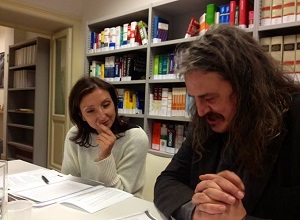
Claudia Di Palermo and Ilja L. Pfeijffer during a workshop at Casa delle Traduzioni, House of Translations (Rome 2013).
Reading a lot, curiosity, the ability to see beyond the text and to take out its true spirit; these are the key words everyone who wants to be a translator usually hears. Claudia also agrees, although she suggests that the most important thing is to know your own mother tongue very well, the most important weapon that every translator must sharpen over the years.
"I would like to encourage those who feel up to it and who are talented to go down this path, as long as they can manage this job while doing other activities. As concerns remuneration, in Italy we are unfortunately still some way behind what is paid in northern European countries".
A special bond with the Dutch language determined by the Fate
Throughout the years, Claudia Di Palermo has realised tirelessly and with great passion an incredible oeuvre of translation, from the soul of Benali torn between two worlds to the disadvantaged Flemish outskirts of Verhulst. And she has gained the trust of Italian publishing houses for her thorough knowledge of the Dutch society and for her love for the Dutch language, that Claudia has always defended even when several years ago some friends from Rome were kind enough to send her Italian newspapers about the suppression of the Dutch (‘’de dreigende afschaffing van het Nederlands’’) in the professional world and at university.
"I am not the same Claudia when I speak Dutch and Italian; when I speak Dutch, I am much more rational and precise. It’s just the nature of language, the grammatical structure corresponds to the structure of thought, so you start thinking differently. I am certainly very Italian in some aspects, but I was already very Dutch in other aspects even before I started learning Dutch. The Netherlands already corresponded to a part of me. In a way, you choose the language, and the language chooses you. Then you get stuck and can’t go back anymore".
During her university years Claudia had probably never imagined, that the same Claudia would start such a brilliant career many years later, nor did she expect that the Dutch language would determine her life so profoundly. It all began by chance in the corridors of the Sapienza University in Rome, when one day Claudia took up listening involuntarily to two voices (two professors of what later turned out to be the Istituto di Neerlandistica) chatting in a "grappige"’ (funny) and "melodieuze" (melodious) language. The Fate knew she wanted to avoid the overcrowded English classes, that’s why it said to her: "Nou, […] dat klinkt toch mooi? Als je nog niet gekozen hebt, kan je toch net zo goed een jaartje aan deze taal beginnen? Daarna zie je wel verder", Claudia wrote in a pamphlet named Against English. Blame it on the Fate, we could say. A Fate that has brought Claudia to build up a varied and impressive oeuvre as a literary translator. "Years later I still bless that day", she said in our interview, "Fate sometimes gives you a little push in the right direction".
